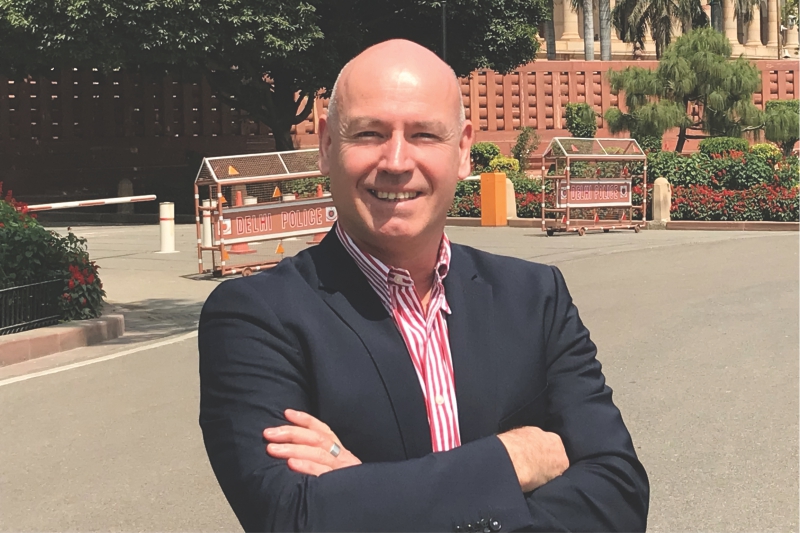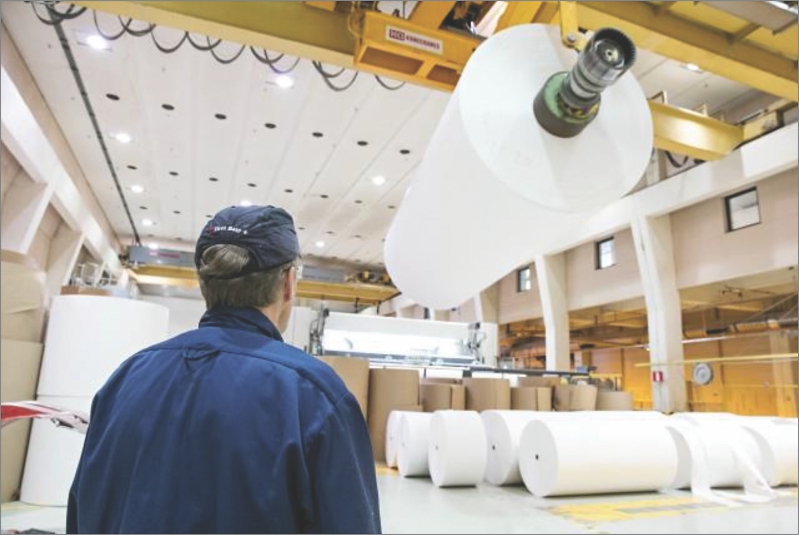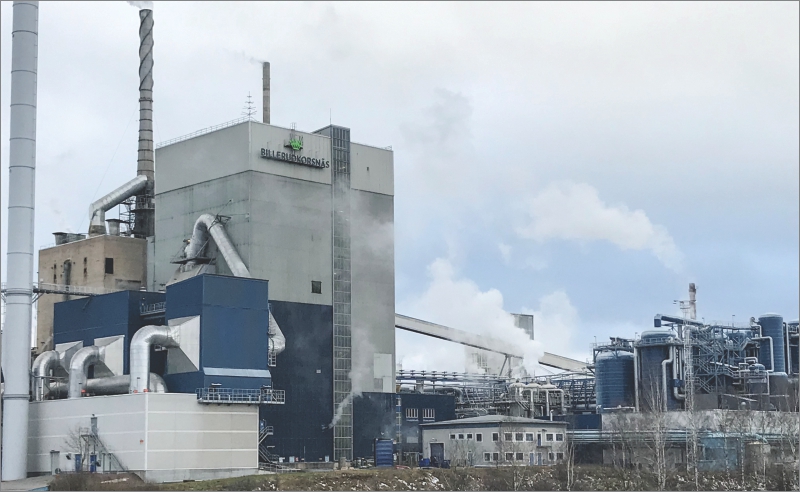Sweden-headquartered BillerudKorsnäs AB is one of the leading providers of packaging materials and solutions that ‘challenge conventional packaging for a sustainable future’. The company has established its presence in more than 100 countries and its production units are in – Sweden, Finland and UK. The company has recently built and ramped up its packaging board machine which is the largest in the world and has the capacity of 550,000 tonnes.

Paper Mart interviewed Mr. Jens Bauer, Sales Director Specialities at BillerudKorsnäs AB, wherein he divulges details about the sustainable packaging solutions, how packaging is a defining aspect of the ‘brand experience’, The Paper Bottle Project, the recent developments at their end and the outlook on the Indian market.
Excerpts from the interview:
Paper Mart: Could you tell us a little bit about BillerudKorsnäs and your role in it?
Jens Bauer: I have been in the Packaging Industry for almost 20 years. Although I am German, I mainly work for the Swedish Headquarters and I often travel around the world. Being responsible for a paper range that we call Speciality Papers, my role covers paper grades that are sold to converters that serve the food industry, bakery/quick-service applications, stainless steel production processes or technical end uses. My team and I, located in various European and Overseas countries, serve all kinds of converters with our materials and knowledge.
PM: What is so special about BillerudKorsnäs papers? Could you tell us a little bit about the packaging solutions you offer your customers?
JB: What is extraordinary about BillerudKorsnäs papers, well, it has a wide product range, being suitable to serve a lot of different purposes and end uses. Our papers, produced on different types of machines, untreated or with surface treatments, are consistent in quality and well introduced to the global market. They ensure high product safety of packaged products, and because of the excellent runnability on all conversion machines, they have economic advantages. In any case, material is nothing without people who understand the converting process, application and customer needs which I would describe as one of the biggest assets. Our Indian Sales Managers know the market and can support every day to secure a smooth business process.

PM: What do you mean when you say that you “challenge conventional packaging for a sustainable future”?
JB: The need for packaging is rapidly increasing every year but most of today’s packaging is made from non-renewable materials, such as plastic out of which only 10% of the plastic packaging materials are effectively recycled, the rest is burnt, ends up in landfills, or even as litter. At BillerudKorsnäs, we hope to bring a transformation by making packaging material of renewable fibers from responsible sources. We are considering the packaging materials that not only protect food or any other inside contents but which can also be recycled and used again. Together with our customers and partners, we discover new opportunities for development throughout the entire chain, from the forest to the finished packaging. For example, we have recently launched two sustainable solutions: Repel Pure- our bio-based grease-resistant paper that is an alternative to conventional fluoropolymer treated grease-resistant papers and Xpression E-com – which is an extremely strong and resilient Kraft Paper for consumer carrier bags and is s substitute for single-use plastic mailing bags.
Despite seeing the current COVID downturn as a threat, we are convinced that in the mid- and long-term, India will return to a growth rate that mirrors the fantastic development the country has enjoyed earlier.
PM: Could you tell us a little bit about BillerudKorsnäs’ position on sustainability? How is BillerudKorsnäs contributing to a better world?
JB: As per the Dow Jones Sustainability Index, we are the most sustainable packaging company in the world. We work for a sustainable and circular society with packaging solutions that are renewable, recyclable and climate efficient. This means ensuring a safe work environment, stable and efficient production, minimizing CO2 emissions by using renewable alternatives instead of fossil resources, and innovation with a focus on sustainable solutions. For instance, we make sure to procure the wood only from sustainable forestry in Scandinavia that is subject to legislation requiring nature conservation and replanting. This ensures that for each tree that is fell at least 3 new trees are planted, and a growing forest absorbs carbon dioxide from the atmosphere. Furthermore, the water we use in the paper production is re-circulated, purified and released back, which means we do not at all consume water – we borrow it and then return it back to nature.
PM: Why is packaging such a crucial element in brand identity?
JB: Having the right packaging is as important as the product that is in it, or sometimes even more important! To have a packaging that serves the purpose, that protects the content, is the practical aspect of it; however, the design and the branding aspect often have a more consequential contribution to the commercial success, especially in the consumer business. Having perfect packaging can make the product stand out and being attractive in the eyes of your target group.
PM: Could you tell us a little bit about ‘The Paper Bottle’ project?
JB: With ‘The Paper Bottle Project’, we aim to match, complement and even outperform existing packaging systems of glass, plastic or metal. We aspire to meet high expectations of brand owners, converters and consumers regarding functionality, design and durability. The goal is to create an overall attractive product for mass production with minimal waste which can provide great opportunities to bring unique design solutions.
With ‘The Paper Bottle Project’, we aim to match, complement and even outperform existing packaging systems of glass, plastic or metal.
The first version of the Paper Bottle came in June 2013 when Danish innovation company ecoXpac, now jointly owned by BillerudKorsnäs, manufactured the first prototype based on recycled paper. Soon the Danish Institute of Technology joined the project and then, also the brewery group Carlsberg. The three companies had assumed the same challenge and complemented each other’s skills. Last year, BillerudKorsnäs and Austrian plastics manufacturer ALPLA formed a joint venture in PaBoCo to further develop and commercialize the paper bottle.

The Paper Bottle project is now in its fourth year and as we develop new packaging and technology, the process of development takes its time. As the development work is in progress, meanwhile, we are hoping to start pilot production in the near future and, depending on the outcome of this current stage, we will eventually scale up and attain significant production within a few years. The vision is that the produced bottles should be biodegradable, 100% recyclable and have environmental benefits over other materials. Our vision is to maximize our positive impact and contribute to the transition to a more bio-based society.
PM: How does BillerudKorsnäs source its wood or fiber? How do you manage risks across your operations and supply chain?
JB: BillerudKorsnäs is fully integrated in the supply of pulp. This ensures a consistent raw material flow from forest to paper production. Our asset base is up-to-date and on the highest sustainability standards. We hold all relevant sustainability credentials like FSC/PEFC and hold the top score in the Dow Jones Sustainability World Index and we have received several awards for our sustainability activities. We source our wood close to our mills and secure our supply with long-term contracts.
Safety for our people and processes are of utmost importance to us. Therefore, we have back-up plans in place to react to any situation that might disturb our routines. Due to decades of experience and long-term contracts with large logistic service companies, we ensure to tackle all the challenges that might occur in overseas supplies. That said, our highest priority is to ensure to provide outstanding service towards our customers.
PM: According to Karin Fagerland, Omega-Pharma, a Perrigo company, “Brand experience is very much associated with the packaging– if it works well and looks good, it will affect what the consumer thinks about your product.” How would you describe the ‘brand experience’ and why does it matter?
JB: All things considered, the idea of ‘brand experience’ relates to brand identity and to me, it means that we deliver value to the customers greater than only the product itself – which is crucial in the today competitive marketplace. Our aim is to deliver not only the best paper in the world in regards to quality and performance but also an overall superior customer journey. We want to ensure that our customers get the attention and support they need before, during and after the actual purchase. This is about being a partner and counterpart rather than only a supplier. In practice, this means that we work in a very close association with our customers. We have a comprehensive MG lab where we supply services ranging from pro-active consultation to on-site technical support and troubleshooting. Our expertise enables us to choose the right material for customer’s equipment, processes and end products.
We have recently built and ramped up the ‘world’s largest’ packaging board machine. It will produce around 550,000 tonnes of board per annum.
We perform real-life seal prototypes in an in-lab thermoforming line, siliconizing evaluations and many other tests. Furthermore, we provide training to our various teams; our technical service team provides onsite or remote customer support, and the business development team explores and investigates new solutions together with converters as well as brand owners around the world. Moreover, we have a team of Wood Experts who ensure the selection of the best raw material and the logistic teamwork to maintain and optimize the delivery activities.
PM: BillerudKorsnäs has worked with a vast array of strong and demanding brands. Could you tell us about the kind of projects you have worked on and the challenges you faced while working on them?
JB: It is an interesting question. While we cannot disclose much about the development partners and projects in detail, but I can reveal that a lot of work is being done in cooperation with brand owners and other industry partners like converters, chemical companies or packaging machine producers. Just to introduce some projects, I would like to mention that we have been working on- developments of compostable flow wraps, stock cubes, ice cream cone sleeves and products for other applications. I think that the main challenge these days is to align the needed barrier properties with the strong desire to have sustainable and, at the same time, cost-competitive packaging. Moreover, it also depends upon the region compostable and/or recyclable solutions are preferred. As we are serving around the globe, we need to have an eye on all these different requests to serve the needs of our customers.
PM: Could you tell us about the recent developments that have taken place in your company? Are you planning to go for business expansion?
JB: We have recently built and ramped up the ‘world’s largest’ packaging board machine. It will produce around 550,000 tonnes of board per annum. The recent investment in the Business Area- Sack and Kraft Paper was to move a paper machine from Finland to Sweden to join it with two other paper machines in the Skärblacka mill and fully integrate it into our own pulp supply. On top of this, we have also equipped one of our paper machines with a surface treatment unit that supports our work around barriers. Part of this investment has been a massive upgrade of our lab facilities. We can support our customers with lab coaters, siliconizing units and various other devices to test and improve their products. We have created a Packaging Design Centre that supports our customers in creating and optimizing tailor-made packaging solutions.
PM: In India, BillerudKorsnäs mainly sells paper in categories such as flexible packaging and technical papers. Is the market in India lively enough for your business? What challenges your business has been facing today?
JB: India is a very interesting emerging market with 1.3 Billion potential consumers and an open-minded society. I have travelled around a lot in India and, on comparing it with other countries; I feel that there are a lot of skilled and curious entrepreneurs who want to develop their own business. Talking to these well-educated owners and leaders in the converting units, it is easy and fun to communicate, discuss and develop ideas, products and markets.
We have also equipped one of our paper machines with a surface treatment unit that supports our work around barriers.
Despite seeing the current COVID downturn as a threat, we are convinced that in the mid- and long-term, India will return to a growth rate that mirrors the fantastic development the country has enjoyed earlier. However, there are some challenges with regard to the infrastructure and logistics that need to be optimized and resolved.
PM: What are your goals for the future?
JB: Firstly, I have to admit that we are very pleased with the recent development we realized. We had established an office in Delhi some years ago and we serve the Indian market with three domestic Sales Managers. We want to continue, together with them, the good work and cooperation with our customers. Some of our customers have been associated with us for 10 years or more. We intend to continue this journey and grow our relationship and presence in India with all relevant converters and brand owners. Our wish is, together with our Indian colleagues, to improve our knowledge and empathy to serve this important market.




